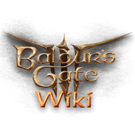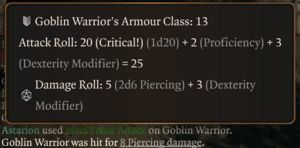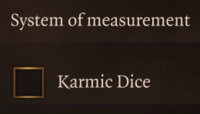More actions
Random variables in Baldur's Gate 3 are determined by dice rolls. Dice are notated with a d followed by the number of sides on that specific die: ![]() d4,
d4, ![]() d6,
d6, ![]() d8,
d8, ![]() d10,
d10, ![]() d12 and
d12 and ![]() d20.
d20.
Mechanics
Dice rolls are abbreviated by specifying the amount of dice rolled, followed by the type of dice, and finally, any applicable modifiers.
When a a single twenty sided die (d20) is rolled with no modifiers, it is abbreviated as 1d20.
When two six-sided dice (d6) is rolled with a modifier of +2, the roll abbreviated as 2d6+2.
The final result of a dice roll is determined by adding together the initial result of all the dice rolled, and then by adding any applicable modifiers:
- Most rolls have an associated ability, and add a creature's respective ability score modifier to the result of the roll.
- Some rolls allow the creature to add its proficiency bonus to the results of the roll.
- Certain equipment, spells, conditions, potions and class features also add a modifier to specific types of rolls.
- Certain environmental effects or circumstances add a modifier to specific types of rolls.
The range of results is usually given in parentheses. For example, a single dart from a spell does 1d4+1 (2-5) Force damage, meaning it rolls 1d4 and adds 1 to the result, giving a possible total of between 2 and 5 points of damage.
Advantage and disadvantage
A creature may have advantage or disadvantage on a roll. A creature with advantage rolls twice and uses the higher result, whereas a creature with disadvantage rolls twice and uses the lower result. A creature with both advantage and disadvantage only rolls once, even if it has multiple instances of either.
Advantage and disadvantage cannot stack. Multiple instances of advantage or disadvantage do not allow a creature to roll more than twice.
Rolls using d20
When a creature rolls dice to determine success, they roll a twenty-sided die (![]() d20) and add the associated ability score modifier to the final results of the roll. If applicable, they also add their proficiency bonus and any other potential modifiers to the result. If the final result equals or exceeds a threshold value, it is considered a success.
d20) and add the associated ability score modifier to the final results of the roll. If applicable, they also add their proficiency bonus and any other potential modifiers to the result. If the final result equals or exceeds a threshold value, it is considered a success.
Rolling a 1 or 20 on a d20 roll is referred to as a "natural 1" or "natural 20". A natural 1 is always an automatic miss, while a natural 20 is always an automatic success.
Attack rolls
When a creature takes an Attack action, they must make an attack roll. Attack rolls are rolled against the target's Armour Class (AC). If the final result of the attack roll is equal to or exceeds the target's AC, the outcome is a hit. Otherwise, it considered a miss.
Attack actions are often made with weapons, but some spells, such as or , also rely on attack rolls.
Melee attacks generally use the creature's Strength modifier, or its Dexterity modifier if the weapon has the Finesse property, and their Dexterity modifier is higher than their Strength modifier. Spellcasters usually use their spellcasting ability modifier for attacks made with spells. Some magical affects, like the spell or a Warlock's , allow spellcasters to use their spellcasting ability modifier for weapon Attack and damage Rolls.
The creature's proficiency bonus is added to the results of attack rolls of Attacks actions taken with weapons they are proficient in. Classes capable of spellcasting add their proficiency bonus to the attack rolls of spells they cast.
When an Attack is determined to be a bit, the creature rolls for damage.
Critical hits
When a creature rolls a natural 20 on an attack roll, it is also a critical hit. A critical hit is considered an automatic hit, and the creatures rolls twice the normal number of damage dice rolled to determine damage, including additional dice such as those from smites or combat manoeuvers. Flat damage bonuses from modifiers or other sources (such as ) are not affected by a critical hit.
Some equipment, feats and class features allow a creature to roll critical hits on natural 19s or lower. These are also considered automatic hits.
Saving throws
When a spell, condition or special ability allows a creature to attempt a save to avoid or reduce its effect, the creature rolls a saving throw against the respective effect's Difficulty Class (DC). If the final result of the roll exceeds the DC, the attempt is successful.
Spells which directly affect a target, such as , or which cause an effect at a fixed point in space, such as or , allow affected creatures to make a saving throw.
A creature may add their proficiency bonus to saving throws they make if they are proficient in its associated ability.
Traps, dialogue events and other sources of danger controlled by the game have a DC defined by the game, depending on how serious the danger is. Spells and weapon actions use specific formulas to determine the DC:
- Spell saves have a DC determined by the creature's spellcasting Ability modifier:
- Weapon actions saves have a DC determined by the higher of a creature's Dexterity or Strength, plus an inherent bonus for that specific action:
Effect of success
A successful save can mean completely avoiding negative effects, reducing the damage received (usually by half), or both. For example, successfully saving against a spike trap could mean that a creature takes no damage at all, because it successfully evaded the spikes. On the other hand, if it's caught in the area of effect of a , then a successful save will merely halve the damage. Saving against both halves the damage taken, and prevents a creature from being pushed by the spell.
Some effects don't allow for a Saving Throw at all, for example the spell .
Ability checks
An ability check is an attempt to succeed at a specific task, and is rolled against the Difficulty Class (DC) of the relevant task. If the final result of the roll exceeds the DC, the attempt is successful.
Ability checks can be automatic and are rolled by the game in the background, often in response to some trigger, they may be active actions taken, or options selected under dialogue.
Most ability checks have an associated skill. If a creature is proficient with an ability check's associated skill, they may add their proficiency bonus to the results of that roll, in addition to the relevant ability score modifier. These rolls are often referred to as "skill checks" by the community, although they are not referred to as such in-game.
Some ability checks are based only on the base Ability Score. A common example is exerting willpower to use the Tadpole's influence on other characters during dialogue. Checks like this have no applicable proficiency, and never add a proficiency bonus.
Damage rolls
Damage rolls are used in the calculation of damage dealt by weapons, spells and certain special abilities, and use a ![]() d4,
d4, ![]() d6,
d6, ![]() d8,
d8, ![]() d10, or a
d10, or a ![]() d12, adding any relevant modifiers to the results.
d12, adding any relevant modifiers to the results.
Damage rolls always have an associated damage type. For example, a dagger typically deals 1d4![]() Piercing damage.
Piercing damage.
Damage rolled after a successful Attacks with weapons typically add the same ability score modifier as the attack roll of the Attack, but some equipment, spells and class feature bypass this.
Damage rolled after a successful Attacks with spell may or may not add a modifier, depending on the spell, the caster's class, and whether they have the necessary class features. For example, the warlock's invocation allows the warlock to add its Charisma modifier to the damage rolls of its .
Magic items, especially weapons, frequently add bonuses to damage, either as additional dice or flat modifiers. Many class features, feats and other effects can increase damage as well, and some (such as ) can reduce the damage as well.
Healing Rolls may also add modifiers, but these are usually fixed and determined by the source of the healing. For example, a Potion of Healing restores 2d4+2![]() hit points. There are many magic items, class features and other effects which also provide bonuses to healing, for example the 's feature.
hit points. There are many magic items, class features and other effects which also provide bonuses to healing, for example the 's feature.
Heals work similarly to damage rolls, but instead restore a target's hit points.
Rolls for initiative
When combat starts, all combatants roll for initiative to determine the turn order. These rolls are determined by rolling a single d4 and adding the creature's Dexterity modifier to the results of the roll.
Creatures with the highest rolls act first. Allied player-controlled characters with the same Initiative result effectively act simultaneously; the player can switch between them to coordinate their actions, and the game waits until all such characters have ended their turns to move on to the next creature.
Karmic Dice
When the Karmic Dice option is enabled (the default), the game will avoid streaks of very low or very high rolls in a row.
However, Karmic Dice influence all rolls – including those of enemies – and the results will only ever skew toward a positive result for the dice roller. In short, the Karmic Dice setting makes combat encounters quicker and deadlier for both you and your enemies.
Karmic Dice was previously referred to as "Loaded Dice".
Random Results
The results of Wild Magic feature of the Wild Magic and the Rage: Wild Magic feature of the are also determined with dice rolls.



